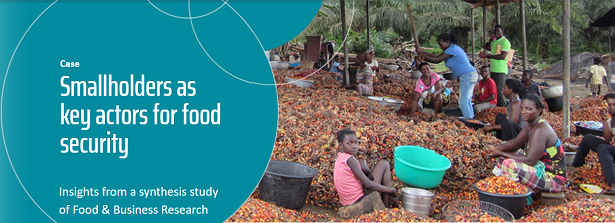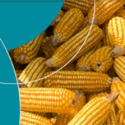Smallholder agriculture: Research-based opportunities for improved food and nutrition security

How can smallholder agriculture contribute to improved Food and Nutrition Security (FNS) for poor farmers in their rural contexts. This is the key question explored in a synthesis paper that has recently been produced discussing Research for Development insights and innovations regarding smallholder farmers. Smallholder farmer households produce 50 to 80 per cent of the world’s food and play a key role in achieving SDG2 on Zero Hunger. Yet, they are among the poorest and most food insecure people in the global South. The synthesis paper stresses that differences among smallholders have significant implications for how donors, governments and development agencies should approach them. Moreover, FNS is multi-dimensional and therefore requires an integrated approach. Combining high-yielding crop varieties with cost-efficient farmer-led irrigation, while working on improved tenure security and inclusive value chains, might be one such integrated approach. Any such approach should be rigorously monitored on process and results to enable adaptive programming and learning.
This paper “‘Smallholders and Food and Nutrition Security” is the fourth thematic publication of a larger series of publications commissioned by NWO-WOTRO, together forming a synthesis study of the Global Challenges Programme (GCP) and Applied Research Fund (ARF) projects under the Food & Business Research programme, executed by Daniëlle de Winter and Ellen Lammers.
The synthesis paper presents insights from nineteen interdisciplinary research projects carried out in nineteen countries in Sub-Saharan Africa and Vietnam between 2014 and 2019. All projects included farmers, researchers, practitioners and business stakeholders. The synthesis paper scrutinized the research projects on three dimensions of FNS, i.e. food availability, access, utilisation and stability. These four dimensions can be summarized as follows:
Food availability refers to the presence of enough food through agricultural production, imports and/or food aid. Projects explored options to increase farm productivity through more resilient crop varieties, better disease and pest management, and improving soil health. A project in northern Uganda, for instance, used participatory methods to select high-yielding and drought-tolerant cassava varieties. To stop the fast spread of diseases it simultaneously taught farmers how to identify common cassava diseases and establish multiplication sites for producing disease-free planting material. Research in Burundi and Uganda led to the development of fertilisers adapted to local soil qualities to replace the generic fertilisers that farmers used. Where farmers in both projects adopted the innovations, yields increased considerably.
Access to food refers to having enough resources to buy or grow food (economic access) and having physical access to food markets. The reviewed projects in the synthesis paper focused on increased production for the market and enhancing smallholders’ inclusion in value chains as pathways towards increased access to food. Insights from the projects show that increased access to food based on higher productivity and market integration is not a given. In fact, very few projects reported that the smallholders used the extra income earned for buying or growing more nutritious food for household consumption.
Utilisation is defined as the safety and quality of food, which determines households’ nutritional status. Findings from projects that researched nutritious indigenous and neglected foods (e.g. spider plant in Benin, fermented dairy in Zambia and leafy vegetables in Kenya) are discussed in another synthesis article. A project with tree-crop farmers growing cocoa and oil palm (Ghana) and macadamia nuts and avocado (South Africa) found that market-oriented production compromised their dietary diversity as farmers changed to less time-consuming and status foods that were less nutritional than their traditional diets.
The 2020 corona pandemic makes painfully clear how vital it is that FNS is guaranteed over time. People should not lose access to adequate food due to sudden shocks and stresses. Projects related this stability dimension of FNS to smallholders’ land rights (specifically those of women), or farm- and land-management strategies such as agroforestry, to improve long-term tenure, environmental and food security.
The synthesis papers stresses that smallholders are highly diverse, innovative and resilient. However, many of them suffer from food insecurity due to structural challenges and vulnerability to external shocks like market disruptions or climatic change. Addressing structural constraints to smallholders’ capacities for strategic action can help improve market access and FNS. Priorities are secure land rights, supportive policies (trade laws, climate change policies) and institutional support (e.g. extension services and access to credit). Moreover, active farmer engagement in project design, knowledge (co-)creation and project implementation supports the development of practical and relevant solutions and enhances research uptake by smallholders. In several cases, active engagement triggered farmers to share their insights with neighbouring communities, thus reinforcing a project’s potential impact.
Downloads
- Download the full paper “Smallholders and Food and Nutrition Security“
- Download the executive summery “Smallholder agriculture: Research-based opportunities for improved food and nutrition security”
Authors: Dr David Betge, Dr Ellen Lammers, Dr Mirjam Ros-Tonen and Daniëlle de Winter.






